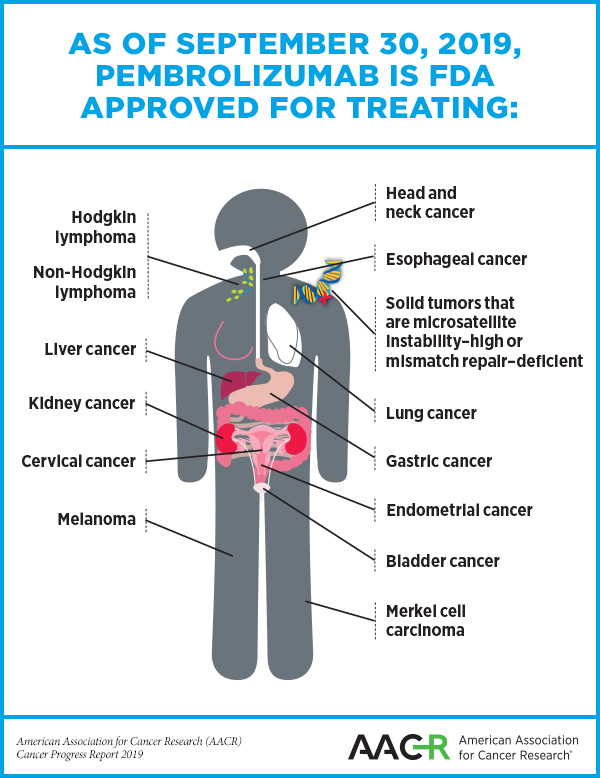AACR Virtual Annual Meeting I: Results Presented Provide Basis for FDA Decision to Approve Alternative Pembrolizumab Dosing Schedule
A short time after Mallika Lala, PhD, finished her presentation titled “Pembrolizumab 400 mg Q6W dosing: First clinical outcomes data from Keynote-555 cohort B in metastatic melanoma patients” at the AACR Virtual Annual Meeting I, the U.S. Food and Drug Administration (FDA) approved the dosing schedule she discussed as a new way to use pembrolizumab (Keytruda) in the treatment of patients with cancer.
Pembrolizumab is an immunotherapeutic that targets the protein PD-1, which is found on the surface of immune cells called T cells. Some cancer cells have a protein called PD-L1 on their surface, and when this attaches to PD-1 on T cells, it slams the brakes on the ability of the T cells to attack and destroy the cancer cells.
Pembrolizumab prevents PD-L1 from attaching to and triggering the PD-1 brake, thereby freeing the T cells to attack and kill the cancer cells. As discussed in a previous post on this blog, the FDA has approved pembrolizumab for use in the treatment of 13 types of cancer and for the treatment of any type of solid tumor that tests positive for either of two specific biomarkers, microsatellite instability–high or mismatch repair–deficient.

Until April 28, 2020, the only dose of pembrolizumab approved by the FDA for administration to patients with cancer was 200 mg every three weeks. Pembrolizumab is administered intravenously, meaning that patients must travel to a doctor’s office or an infusion clinic to receive the treatment.
Lala, who is associate principal scientist in the Quantitative Pharmacology and Pharmacometrics group at Merck, the company that developed pembrolizumab, presented interim data from a clinical trial in which a dosing regimen of 400 mg of pembrolizumab every six weeks was investigated as an alternative to the standard 200 mg every three weeks regimen in the treatment of patients with metastatic melanoma. She explained that having two alternative dosing regimens “offers convenience and flexibility to both patients and providers, the need for which is particularly exemplified by the current COVID-19 pandemic.”

The results Lala reported were from cohort B of the phase I KEYNOTE-555 clinical trial, which is ongoing at this time. There are 101 patients who have unresectable stage 3 or stage 4 melanoma enrolled in Cohort B. None of the patients had received systemic treatment after receiving this diagnosis.
At data cut-off on February 6, 2020, there were 44 patients for whom data on tumor response was evaluable. Among these 44 patients, 39 percent had partial or complete tumor shrinkage. This overall response rate (ORR) compared favorably with an ORR of 35 percent that Lala and colleagues calculated from three prior clinical trials investigating the standard dosing regimen for pembrolizumab. “Thus, response rate is maintained with the (every six weeks) dosing,” said Lala.
Interim safety analysis showed that 11 of the 44 patients had a grade 3 or grade 4 adverse event, which Lala explained was consistent with the safety profile of pembrolizumab that has been established while testing it in clinical trials across multiple types of cancer.
Lala concluded her presentation by noting that pharmacokinetic data for the standard 200 mg of pembrolizumab administered every three weeks is similar across all types of cancer for which the immunotherapeutic is approved. She then added that these data were similar for the 400 mg every six weeks dosing regimen.
The data presented by Lala provided the basis for the FDA’s decision to approve 400 mg of pembrolizumab every six weeks for use as a new dosing regimen across all currently approved adult indications.
Convenience, quality of life, and reducing health care costs are important issues for patients who receive PD-1–targeted immunotherapeutics, explained Siwen Hu-Lieskovan, MD, PhD, from the Huntsman Cancer Institute at the University of Utah, who was the discussant of Lala’s presentation during the Immunotherapy Clinical Trials 2 Clinical Plenary Session at the AACR Virtual Annual Meeting I.



